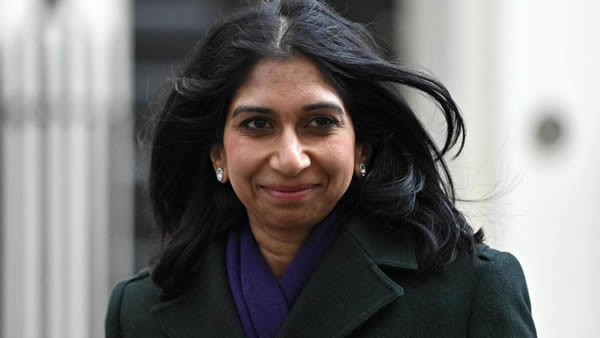
British Home Secretary Suella Braverman has set out plans for new powers which would ban refugees who cross the English Channel from claiming asylum and said it was her “dream” to see a government flight deporting asylum seekers to Rwanda.
The government has been under pressure to deal with the rising number of people making dangerous journeys despite plans to deport those arriving by irregular means to Rwanda.
More than 30,000 people have made the crossing in small boats so far this year, already surpassing last year’s record. Government officials have warned the total could reach 60,000 by the end of 2022. Dozens have died in the attempt in recent years.
Braverman used her speech to the governing Conservative Party’s annual conference to commit to looking at new legislative powers so the government can deport those who come to the United Kingdom irregularly.
“We have to stop the boats crossing the Channel. This has gone on for far too long,” Braverman said.
“I will pledge to you today that I will bring forward legislation to make it clear that the only route to the United Kingdom is through a safe and legal route.”
The new powers would go further than existing legislation and were designed to create a blanket ban on anyone who enters the UK irregularly, including on small boats across the English Channel, from claiming refuge, a government source said.
‘Barbaric’
The charity Care4Calais called the government’s proposals “barbaric, untruthful and unnecessary” and said most asylum seekers who come to the UK are genuine refugees.
This “is blatant victim blaming of incredibly vulnerable people, simply for the purpose of grabbing headlines”, said Clare Mosley, the founder of the charity.
“If this government truly wanted to stop small boat crossings it would offer safe passage to those who have a viable claim for asylum,” she said.
Tim Naor Hilton, chief executive of the group Refugee Action, said such a move would be “a blatant breach of the international refugee laws that the UK proudly helped create in the first place”.
The previous prime minister, Boris Johnson, had hoped that a plan to deport those arriving illegally to Rwanda would act as a deterrent to those arriving in dinghies and small boats, but numbers hit record levels earlier this year.
The first planned deportation flight in June was blocked by a last-minute injunction from the European Court of Human Rights.
Braverman said earlier at an event on the fringes of her party’s conference that she will work to prevent the court from overruling the British government in future, but does not expect any planes to take off until the new year, because of continuing legal challenges.
She said seeing a flight leaving to take asylum seekers to Rwanda is her “dream” and “obsession”.
Under a deal signed in April, the UK said it would send some migrants who arrive in the UK as stowaways or in small boats to Rwanda, where their asylum claims would be processed. Those granted asylum would stay in the African country rather than returning to the UK.
The UK has said the policy will deter people-trafficking gangs who ferry migrants across the English Channel.
Human rights groups have said it is unworkable and inhumane to send people thousands of miles away to a country they do not want to live in.
The UK has already paid Rwanda 120 million pounds ($137m) but no one has been sent there as part of the deal.
The UK was forced to cancel the first deportation flight at the last minute in June after the European Court of Human Rights ruled that the plan carried “a real risk of irreversible harm”.
Several asylum seekers, aid groups and a border officials’ union are taking legal action against the government, with a hearing due later this month.
Braverman, who was appointed last month by new Prime Minister Liz Truss, told an audience at the Conservative Party’s annual conference that she was seeking to expand the policy.
“We’re looking actively at negotiating with countries who will take our asylum seekers,” she said.
The crossings, and how to stop them, have been a source of friction between the UK and France. Braverman said the UK was committed to working with France to stop the smuggling gangs.
She said French authorities were stopping between 40 percent and 50 percent of boats trying to leave.
“That’s not good enough but it’s better than nothing,” she said.
Source: News Agencies











